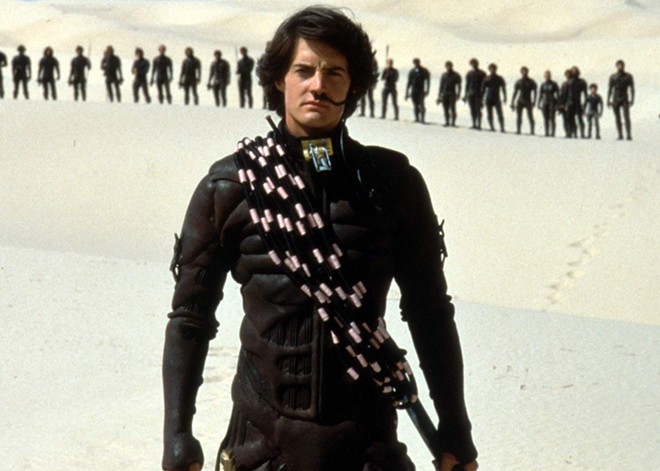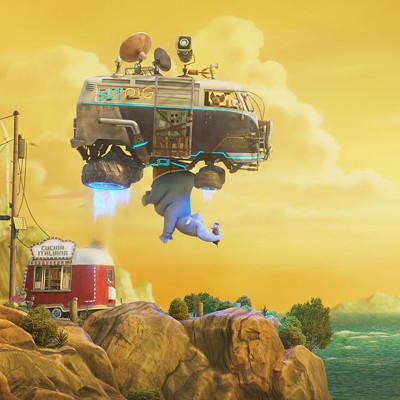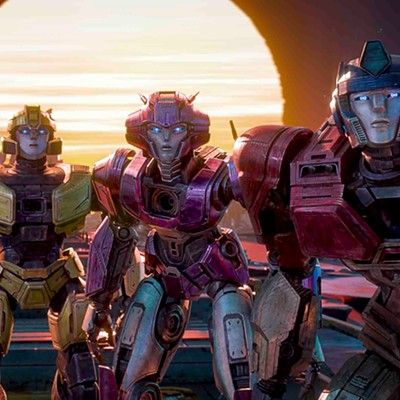As impressive as director Denis Villeneuve's vision may be for his film adaptations of Frank Herbert's novel Dune, it's also somewhat clinical and reserved, with little room for messy experimentation. In that way, it's the opposite of the early attempts to adapt Herbert's 1965 novel, which in the 1970s and '80s was in the hands of two bold, eccentric filmmakers: Alejandro Jodorowsky and David Lynch. Though both of their onscreen ambitions for Dune were either thwarted or compromised, it's still fascinating to look back at the grand, bizarre concepts they put forth.
Jodorowsky's film never made it past pre-production, but the entire process is chronicled in the 2014 documentary Jodorowsky's Dune, which features plenty of concept art and storyboards from Jodorowsky's elaborate pitch package. The avant-garde filmmaker behind the surreal, often shocking cult films The Holy Mountain and El Topo is an unlikely candidate to take on a potential blockbuster sci-fi franchise, but when Jodorowsky acquired the rights to Dune in 1974, the property was out of favor with Hollywood.
Jodorowsky used that freedom to mount a loose adaptation of the novel, which he hadn't even read before pursuing the project. In Jodorowsky's Dune, he describes a movie that would have most likely been a spectacular disaster, with starring roles for David Carradine, Salvador Dali, Mick Jagger and Orson Welles, among others, along with Jodorowsky's own 12-year-old son in the main role of Paul Atreides. Jodorowsky recruited out-there artists H.R. Giger, Jean "Moebius" Giraud and Chris Foss to design the world he wanted to present, and Jodorowsky's Dune includes some gorgeous, baffling imagery, occasionally brought to life via rudimentary animation.
"You must not respect the novel," Jodorowsky said about his approach to adaptation, and his ideas certainly would have invoked strong negative reactions from hardcore Dune fans. Anyone who's seen Jodorowsky's other films knows that he takes an impressionistic, psychedelic approach to storytelling, and he would have turned Herbert's meticulous world-building into chaos. The Jodorowsky version of Dune that exists only in the imaginations of the people who worked on it — along with viewers of the documentary — is probably more satisfying than whatever sprawling nightmare Jodorowsky would have actually delivered.
Toward the end of Jodorowsky's Dune, Jodorowsky describes his gleeful reaction to finally seeing David Lynch's 1984 version of Dune and discovering that it's "awful." Lynch himself, who has all but disowned his troubled film, might agree. Both would place the blame on producers, who forced Lynch to rein in his vision in a way that Jodorowsky was never willing to do. That means that Lynch's film actually got made, but it's clearly the result of studio tinkering, with its ubiquitous voiceover exposition and an absurdly rushed final act.
Yet as maligned as Lynch's film has been, it features nearly as many satisfyingly strange elements as in Jodorowsky's interpretation, turning it into a hallucinogenic dreamscape that fits perfectly into Lynch's filmography alongside movies like Eraserhead and Lost Highway. The nonstop narration from Kyle MacLachlan's Paul Atreides and other characters sounds like demented ASMR, contributing as much confusion as clarification. The mutated guild navigator in the opening scene speaks through a mouth that looks like a vagina. The pus-covered Baron Harkonnen (Kenneth McMillan) floats around like he's just had some of Willy Wonka's fizzy lifting drink. Patrick Stewart's Gurney Halleck charges into battle carrying a pug.
Lynch's Dune is a grotesque, grandiose, entirely incomprehensible fiasco, but it's mesmerizing to watch. Lynch produces the cinematic equivalent of a 20-minute prog-rock song, piling excess upon excess. He's terrible at staging action sequences, and the movie completely falls apart in its last 45 minutes, which cram in roughly the same amount of Herbert's novel that's covered in Villeneuve's entire (nearly three-hour) Dune: Part Two. Lynch clearly was the wrong person to helm a big-budget studio tentpole, but his failure is far more interesting than the typical mediocre '80s space opera designed to capitalize on the popularity of Star Wars.
It may be easier to appreciate Jodorowsky's and Lynch's failures now that Villeneuve has produced such a success, and there's no reason that multiple takes on such a beloved, iconic work of literature can't exist simultaneously. There's room for the idiosyncratic calamities alongside the polished, immersive epic.
Dune (1984) and Jodorowsky's Dune are streaming on Max.





















